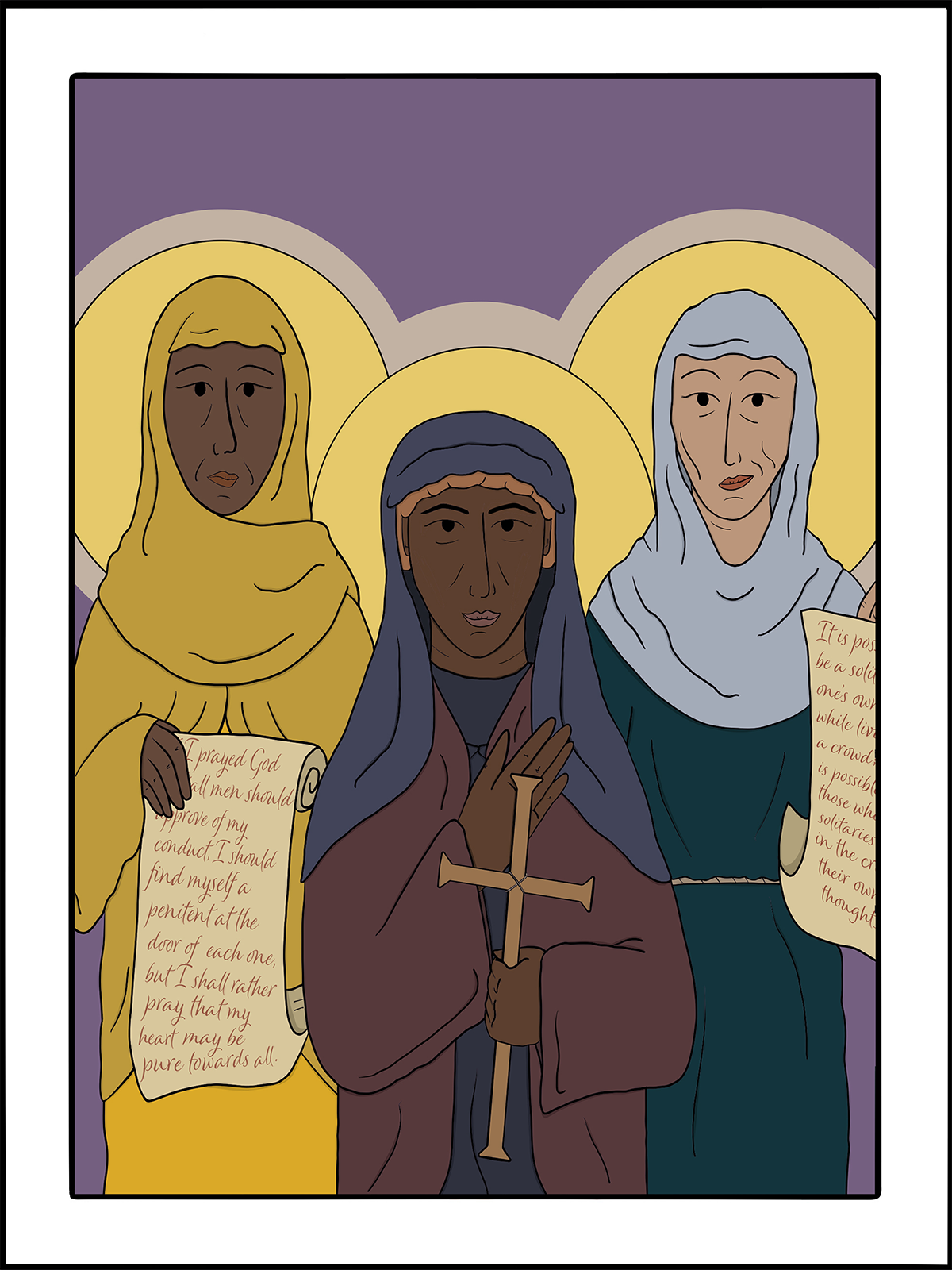
January 5
Sarah, Theodora, and Syncletica of Egypt
Desert Mothers, 4th- 5th Century
art by Rev. Kirsten Kohr of Uhrichsville, OhioFix our hearts on You, O God, in pure devotion, that aided by the example of your servants Sarah, Theodora, and Syncletica, the vain pursuits of this world may have no hold upon us, and that by the consuming fire of your Spirit, we may be changed into the image and likeness of your Son, Jesus Christ our Lord; to whom with you and the same Spirit be all honor and glory, now and for ever. Amen.
Sarah, Theodora, and Syncletica are the three desert mothers, or ammas, whose sayings are included in the fifth-century Apophthegmata Patrum, the sayings of the desert fathers. The collection includes forty-seven sayings attributed to these three women.
The sayings relate that Amma Sarah lived beside a beautiful river for sixty years, yet never lifted her eyes in distraction from prayer to look at it. She often said, “If I prayed to God that all men should approve of my conduct, I should find myself a penitent at the door of each one, but I shall rather pray that my heart may be pure towards all.” Many people came to visit her seeking spiritual advice. On one occasion some monks came to her claiming to be from the highly regarded community of Scetis, and she offered them a basket of fruit from which they took the rotten fruit and left the good fruit for others to eat. She then said to them, “You are true monks of Scetis.” At another time, some elderly monks, considered to be great anchorites, came to see her hoping to humiliate her and shame her. They came to her and said, “Be careful not to become conceited because we great anchorites are coming to see you, a mere woman!” Amma Sarah only replied, “According to nature I am a woman, but not according to my thoughts. It is I who am a man and you who are women.”
Amma Theodora was the wife of a Roman tribune, but after his death, she retired to the desert to live an ascetic life. She was consulted by many people for her wisdom on prayer. According to one of her teachings, those who set their minds to pray are often overcome with distraction, depression, faintheartedness, or headaches. But she relates the story of how one monk, every time he felt too ill to pray, declared: “Clearly I am very near death, and so I should get up and pray right now before I die!” In this way, he resisted temptation. Yet Amma Theodora also stressed that temptations can only be overcome through humility rather than through asceticism, for even the demons fast and keep vigil and live in deserted places, but they do not have humility.
Amma Syncletica lived a life of asceticism in a tomb in Alexandria. She wrote, “if you find yourself in a place, do not forsake it to go to another place, for that will harm you a great deal. Just as a bird who abandons the eggs she was sitting on prevents them from hatching, so too a monastic grows cold and her faith dies when she wanders from one place to another.” She also taught that it was possible to live a spiritual life within secular society, not only as a monk or a nun. “There are many who live in the desert yet behave as though they were in town, and they are wasting their time. It is possible to be a monastic in one’s mind while living in a crowd, and it is also possible for a monastic to live in a crowd amidst her own thoughts.”
Excerpted directly from “Lesser Feasts and Fasts 2022,” p. 26-27.
Lessons and Psalm Proverbs 9:1-6
Psalm 119:65-72
Mark 12:18-27
Preface of the Incarnation

